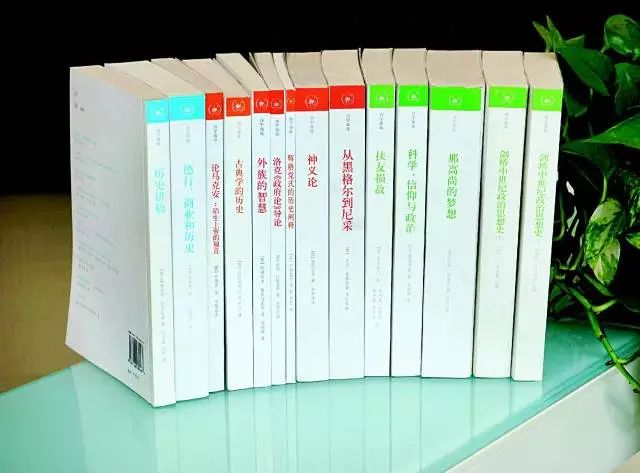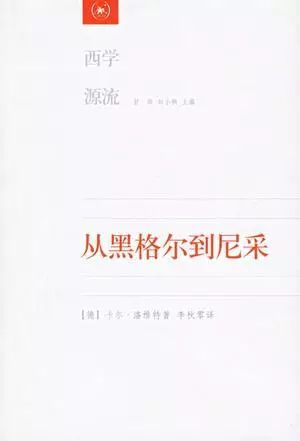

Publications
Articles
30th Anniversary of "Culture: China and the World" | Book List: "Sources of Western Scholarship"
2016-12-30
Sourced from WeChat Official Account:Boya (Liberal Arts) College of Sun Yat-sen University

At the beginning of the new century, Gan Yang and Liu Xiaofeng, former members of the editorial committee of "Culture: China and the World" continued their collaboration with SDX Joint Publishing (Sanlian Bookhouse) to curate this series of translated Western classics promoting "re-reading the West with a healthy mindset and clear thinking" and "reading the West according to its own context". This represents a further advancement and deepening of the editorial committee's original efforts. The series launched its first version in 2006, From Hegel to Nietzsche: the Revolution in Nineteenth-Century Thought (by Karl Löwith). To date, 13 volumes have been published, with more to come.
General Preface
Re-reading the West
Gan Yang Liu Xiaofeng
In the early 20th century, Chinese scholars proposed that Chinese history was shaped by successive layers. However, they seemingly overlooked the possibility that Western history might have also been composed of layers. This "layered fabrications theory" stemmed from a perception that Chinese history was largely built on superstition, myth, and errors. In contrast, Western history was viewed as embodying science, rationality, and truth—at least according to what they had heard. As Gu Jiegang (1893-1980) put it, when Dr. Hu Shi (1891-1962) "brought Western historical methodology back to China", it led his generation of scholars to an "epiphany" that many ancient Chinese texts were "pseudographs", and that ancient Chinese history itself was a "pseudohistory" constructed from such "pseudographs". Yet, it had never occurred to Chinese scholars at that time that the Western history introduced by Hu Shi and others might itself be a "pseudo-Western history" created from "Western pseudographs".
It is no exaggeration to say that there has been a sort of pathological mindset in the way in which Chinese have read the West over the past century under the pretext that China was sick and the West the cure. For this reason, "reading the West" meant a quest to gather prescriptions and remedies for China's "illness" and studying abroad meant going to the West to seek out the truth that would correct China's errors. This pathological mindset has fostered a generation of intellectuals with a distorted view of China and led to various forms of pathological discourse and scholarship. This is characterized by a relentless simplification, instrumentalization, and idealization of Western scholarship, while oversimplifying, distorting, and even demonizing Chinese civilization. This pathological way to read the West is the source of the real infections that have created all sorts of challenges facing modern China.
The new generation of Chinese scholars in the 21st century needs to break free from this pathological mindset and begin re-reading the West anew. This does not mean going to the West yet again in search of new special formulas or miracle cures, but rather adopting a correct mindset, establishing a sense of self-identity first, and approaching Western thought with a healthy mindset. A healthy approach to read the West begins by studying it within its own historical and intellectual context. A sensible reader understands that, if Western thoughts offer any "remedies" or "panaceas", they are primarily meant to treat the West's own illness. For instance, Plato's philosophy aimed to cure the ills of ancient Greek democracy; Augustine's theology sought to cure the civic ills of ancient Rome; Machiavelli's historical analyses targeted the problems within Christianity; Rawls's theory of justice sought to treat the defects of Anglo-American utilitarianism; and Nietzsche and Heidegger aimed to remedy the problems of European metaphysics. To truly comprehend the nature of Western thoughts and scholarship, we must engage with it on its own terms, following its unique historical trajectory. In short, a healthy approach to study Western thoughts differs from the past pathological way of reading. It focuses primarily on Western problems and the development of those problems, rather than seeking ready-made answers to China's problems.
Those who adopt a healthy approach to study the West should fundamentally reject superficial comparisons between Chinese and Western civilizations. Instead, they should be more interested in exploring the complexities and contradictions within Western culture. This includes exploring the clash between the two major roots of Western civilization—the Greek and the Hebrew traditions, the tension between classical and modern Western thoughts, the divergence between the British and American systems, and the ongoing ideological struggle between liberalism and conservatism within the United States, among others. Those who engage in a healthy studying of the West argue that it's crucial to first sort out the differences, contradictions, and conflicts within Western civilization. Without this foundation, attempts to construct a binary opposition between Eastern and Western civilizations or to promote the notion of cultural harmony based on the idea that "despite geographical differences, the East and the West share underlying consistency and commonality in their cultural psychology" are ultimately meaningless.
Chinese readers who adopt a healthy approach to study the West approach Western ideologies and systems with a skeptical attitude, and even more so with regard to the latest trends and novel theories emerging within contemporary Western academia. They have valid reasons to suspect that Western scholarship is deteriorating over generations, as the rapid turnover of buzzwords and the frequent replacement of fashionable theories often signify a trend toward intellectual superficiality. Moreover, these readers adopt a mildly mocking attitude toward the pretentious rhetoric surrounding the so-called "anti-Eurocentrism" in Western academic circles. They recognize that while the original intent of such arguments may be well-meaning, their outcome is often nothing more than a narrower form of Western-centrism. As they say, "there is nothing new under the sun."
A growing number of Chinese scholars are advocating for a more nuanced and sensible understanding of Western thoughts, which has led to the creation of this series of "Sources of Western Scholarship". The topics in this series generally focus on several key areas: first, the in-depth reading and interpretation of Western classics and authors by Western scholars; second, analyses and examinations of the historical evolution of significant issues in Western civilization; and third, studies in the "history of disciplines", which involve research and reflection on the formation processes and problems of various contemporary disciplines. The books in this series offer no ready-made answers to China's problems, as the authors focus on addressing issues in the Western society. When studying the West, Chinese scholars should avoid a short-sighted, superficial approach. The quick and convenient transplanting of Western ideas and systems into China is bound to fail. In fact, many popular Western concepts, such as democracy and freedom, are fraught with ambiguities. The new generation of Chinese scholars should first seek to understand the West through its own historical and intellectual context, delving into the debates and conflicting ideas within Western thought, to understand its strengths and weaknesses and develop a broad, discerning perspective for making thoughtful judgements.
Twenty years ago, we served as chief editors for two series published by Sanlian Bookhouse: the "Library of Modern Western Scholarship" and the "New Knowledge Library." We received tremendous support from many esteemed scholars of previous generations. Sadly, most of them have passed away, leaving us with a profound sense of nostalgia and deep respect. Academic progress thrives on inheritance and accumulation. We were deeply influenced by the translated works of Zhu Shenghao (1912-1944), Luo Niansheng (1904-1990), and other luminaries, in our childhood. Later, we were fortunate to receive the guidance of pioneering Chinese scholars in Western studies, such as Hong Qian (1909-1992), Zong Baihua (1897-1986), Xiong Wei (1911-1994), He Lin (1902-1992), Wang Jiuxing (1916-2003), Yang Yizhi (1912-1989), and Wang Taiqing (1922-1999), whose teachings have left an indelible mark on us. These mentors instilled in us the importance of approaching Western thoughts with a healthy attitude and sound mind, a practice crucial for the healthy development of Chinese thoughts and scholarship. We dedicate this series of the "Sources of Western Scholarship" to them as a token of our gratitude, and hope that it will grow alongside the next generation of Chinese readers on their intellectual journey.
New Year's Day, 2006






